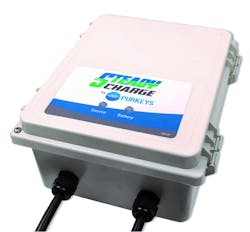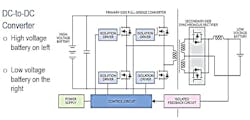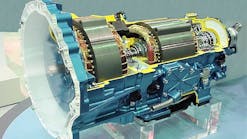Purkeys announces SteadyCharge accessory battery charger
Purkeys, a battery solutions company delivering innovative, cost-effective solutions for the electrical needs of heavy duty fleets, announced the introduction of its new SteadyCharge accessory battery charger. The SteadyCharge is designed to monitor and maintain an optimal charge level in accessory batteries serving trailer refrigeration and heating units, by preventing battery depletion during periods of inactivity.
Battery maintenance and repair costs have a significant impact on the bottom line of fleets and owner-operators alike, particularly those operating refrigerated or heated trailers. Inactive batteries naturally discharge over time and can drain a temperature-controlled vehicle’s accessory battery during seasonal periods when its dependent engine is not in service. Additionally, the parasitic current draw from built-in telematics technology in many heating and cooling units can completely drain their starter battery within just a few days of sitting idle, and the downtime and service cost of jumping or replacing dead batteries can add up fast.
Purkeys’ SteadyCharge maintains accessory batteries during months of non-use without overcharging them and is operational whenever the tractor is connected to the trailer. It eliminates the need for extra charging cables and automatically charges using the trailer’s existing seven-way cable, and it won’t interfere with other devices on the auxiliary circuit, such as the trailer’s ABS system.
“Many large fleets spend millions of dollars on battery maintenance and replacement annually, and that’s not including asset downtime,” said Jimmy Fielding, northeast account representative for Purkeys. “Not only will the SteadyCharge significantly reduce battery maintenance and repair costs, it will keep vehicles and drivers on the road by extending the lifespan of existing batteries by up to 500 percent.”
Fielding also noted that accessing batteries in trailer refrigeration and heating units for maintenance or replacement can present its own set of challenges and safety concerns. “The units are usually mounted high on the nose of the trailer, and a standard Group 31 battery generally weighs in the neighborhood of 65 to 75 pounds,” he said.
The durable, 10lb SteadyCharge is engineered to meet SAE J1455 testing criteria and is IP66 rated for exterior mounting on the trailer body. The charging system’s logic controller includes a low voltage disconnect (LVD), which protects tractor batteries and is programmable to any LVD setpoint. The SteadyCharge also features temperature-compensated charging that automatically optimizes its charging characteristics to match its operating climate.
The SteadyCharge is built to handle the harshest road conditions and comes with a three-year warranty. Convenient LED status indicators assure users of proper functioning and alert them of any issues.
“Accessory batteries may not respond when called upon to start refrigeration and heating units that have been dormant, or they may die while the vehicle is in the field, requiring a service run or even a replacement vehicle deployment,” Fielding said. “Unfortunately, many fleets and owner-operators think of battery-related maintenance expenditures as just part of the cost of doing business.”
By constantly replenishing a battery’s charge, users can avoid depletion, even when vehicles have been inactive for months. Battery-related removal and replacement costs and time-consuming workflow interruptions can be minimized, as can the fuel cost to run climate-control units during off-season duty cycles. By maintaining a shallow depth of battery discharge, the SteadyCharge helps a battery’s life span transition from months to years.
“The SteadyCharge is a must-have item for truck drivers and fleets with refrigerated or heated trailers,” Fielding said. “It will be a game-changer for those in cold-chain transportation, and for those hauling liquids like beverages and paints that must be kept from freezing in cold weather.”


